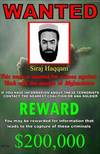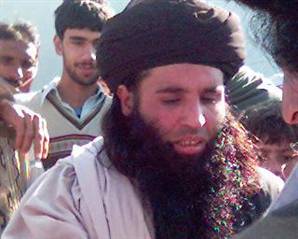Yesterday’s coordinated small-arms attack and suicide bombings at the five-star Serena hotel in Afghanistan’s capital of Kabul have been traced back to a senior Taliban commander based out of northwestern Pakistan, according to Afghanistan’s intelligence chief. Siraj Haqqani, the leader of the dangerous Haqqani network, has been implicated in the Serena strike.
The details of the attack are still being sorted out. At least seven people were reported killed, including two guards, three hotel employees, and a Norwegian reporter. Strategic Security Solutions International, the company responsible for security at the Serena, said four attackers were involved. The Taliban fighters were dressed in police uniforms, and were equipped with suicide vests, hand grenades, and AK-47 assault rifles. The Long War Journal has obtained Strategic Security Solutions International’s account of the attack:
Four gunmen, three dressed in what appeared to be ANP [Afghan National Police] (or similar) uniforms attempted to enter the main gate at the Serena Hotel. A security guard was shot and killed. The remainder of the guards engaged the attackers and two were killed in the vicinity of the security control room at the main gate. At least three of the attackers were reportedly wearing BBIED [body-borne improvised explosive] devices. The two attackers killed at the gate, were killed when one of the devices detonated. Three guards were injured in this detonation. During the ensuing confusion, one of the attackers managed to enter the hotel and proceeded to open fire indiscriminately. The forth attacker reportedly fled. Unconfirmed reports indicate that seven people including international visitors were killed by the gunman, who may also have been using hand grenades during his attack. Attempting to leave the Hotel, the gunman was captured by a security guard and handed over to reacting police. A delegation from the Norwegian Embassy, were meeting in the hotel at the time of the attack.
Amrullah Saleh, the head of Afghanistan’s intelligence service, said three Taliban were involved. According Saleh, at least two of the attackers were stopped at a police checkpoint at the entrance to the Serena and detonated their suicide vests. A third attacker penetrated the security during the assault and fired in the lobby and at the hotel gym. It is believed he then changed into civilian clothes and was later captured inside the hotel.
The capture of one of the attackers has led to the arrest of four members of the Haqqani Network. “We’ve captured the planners of this terrorist attack,” said Saleh. “A man said to have transported the attackers to the hotel and two suspected of accommodating them in the city” were arrested by police, The Times reported. Police raided the safe house in Kabul used by the attackers and “found a video showing two of the assailants, identified as Farouq and Salahuddin, saying they were ready to die.”
Saleh said Mullah Abdullah, an underling of Taliban commander Sirajuddin Haqqani, planned and executed the attack. “Police arrested a man named Humayun, allegedly a key link to Abdullah, in eastern Afghanistan on Tuesday as he was trying to flee to Pakistan,” The Associated Press reported. Saleh accused Humayun “of supplying the assailants with weapons, explosives and suicide vests and driving them to the hotel,” according to the AP report.
|
Multimedia presentation of the senior Taliban commanders in Pakistan and Afghanistan. Click to view. |
Siraj Haqqani is the son of renowned Taliban leader Jalaluddin Haqqani, a leader of the Taliban in North Waziristan with close ties to Osama bin Laden and the Taliban. Siraj is believed to be running the Haqqani Network, and has become a focal point of Coalition operations. Siraj has a $200,000 bounty for his arrest. He has embraced al Qaeda’s tactics and ideology, and has recruited foreign terrorists to act as suicide bombers and operatives inside Afghanistan.
The Haqqani family runs several mosques and madrassa, or religious schools, inside of North Waziristan near Miramshah. The Pakistani government closed down the radical Haqqani-run Manba Ulom madrassa after the US commenced Operation Enduring Freedom in Afghanistan, but the school was reopened in 2004. The Manba Ulom madrassa has been described as “a center of jihadi activities, and where top Taliban and al-Qaeda commanders meet.”
The Pakistani government is currently in negotiations with the Taliban in North Waziristan. The 2006 North Waziristan Accord ceded control of the tribal agency to the Taliban. The Taliban and al Qaeda are known to operate 29 training camps in North and neighboring South Waziristan, and use the tribal areas to conduct attacks against US and Afghan forces.










2 Comments
There’s a very interesting article in the New York Times today detailing the deteriorating interaction between Pakistan’s ISI and the terrorist groups they initiated in years past. It refers to the Haqqani Network as well.
——————————————–
Asked in 2006 why the Pakistani government did not move against the leading Taliban commander Jalaluddin Haqqani, and his son Sirajuddin, who are based in the tribal areas and have long had links with Al Qaeda, one senior ISI official said it was because Pakistan needed to retain some assets of its own.
That policy haunts Mr. Musharraf and the United States, according to American and Pakistani analysts. Today Pakistan’s tribal areas are host to a lethal stew of foreign Qaeda members, Uzbek militants, Taliban, ISI-trained Pakistani extremists, disgruntled tribesmen and new recruits.
New York Times: Militants Escape Control of Pakistan, Officials Say
Afghanistan, Paksistan and even Israel
Violence in Pakistan continues to metastasize to the point where the government finally seems serious about fighting the Islamists. It is spilling over into Afghanistan somewhat too, but things are decidedly better in the poorer and more primitive coun…